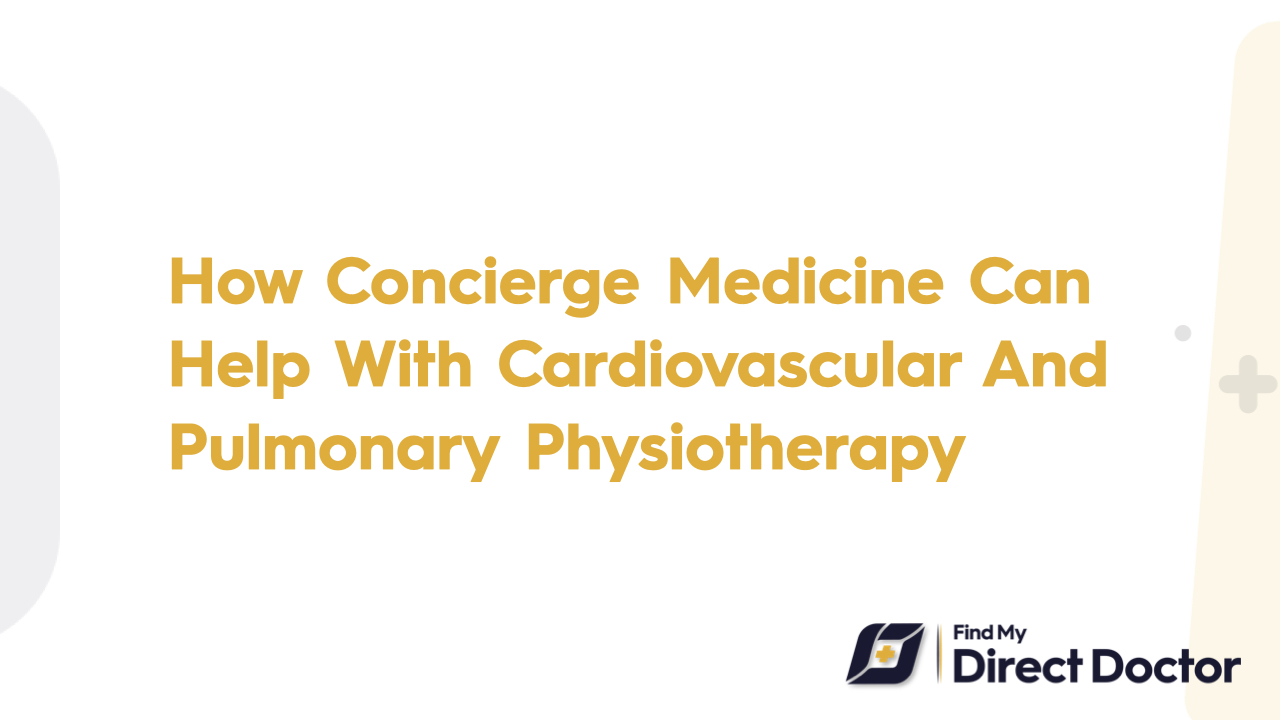



Concierge medicine is redefining patient care by focusing on personalized, accessible, and comprehensive healthcare solutions tailored to individual needs. This model is particularly beneficial for patients undergoing cardiovascular and pulmonary physiotherapy, which plays a crucial role in managing and rehabilitating conditions affecting the heart and lungs. As these conditions can significantly impact an individual's quality of life, the supportive and individualized approach of concierge medicine enhances both the treatment process and overall outcomes for patients.

Cardiovascular and pulmonary physiotherapy is a specialized area of rehabilitation designed to improve the physical functioning and overall health of individuals with cardiovascular and pulmonary conditions. This type of therapy is essential for patients recovering from heart surgeries, managing chronic lung diseases, or recovering from cardiovascular events such as heart attacks or strokes. The procedure typically involves a comprehensive assessment by physiotherapists who work closely with patients to develop tailored exercise programs that address their specific needs.
The primary goal of cardiovascular and pulmonary physiotherapy is to enhance physical endurance, improve respiratory function, and promote an active lifestyle. The treatment plan may include aerobic exercises, strength training, breathing exercises, and education on self-management strategies for managing symptoms and preventing future complications. The physiotherapist continuously monitors the patient's progress, adjusting the program as necessary to ensure optimal results.
In addition to physical exercises, the therapy often encompasses education on lifestyle modifications, including dietary changes, smoking cessation, and stress management techniques. This holistic approach not only aids in physical recovery but also empowers patients to take control of their health, making informed decisions about their lifestyle and treatment.
One of the primary advantages of concierge medicine for patients undergoing cardiovascular and pulmonary physiotherapy is the personalized care model. In traditional healthcare settings, patients may experience limited time with their healthcare providers, leading to a less individualized approach. Concierge medicine prioritizes the doctor-patient relationship, allowing for more in-depth discussions about health concerns, rehabilitation goals, and treatment options. This level of attention ensures that each patient's unique circumstances and preferences are considered throughout their care journey.
Concierge medicine also enhances accessibility, an essential factor in managing cardiovascular and pulmonary conditions. Patients often face challenges related to mobility or scheduling, which can impede their ability to attend therapy sessions consistently. Concierge practices typically offer flexible scheduling options and various care delivery methods, including in-home visits and telehealth consultations. This flexibility helps eliminate barriers to care, enabling patients to engage fully in their rehabilitation programs and adhere to prescribed treatments.
Moreover, concierge medicine fosters a multidisciplinary approach to cardiovascular and pulmonary rehabilitation. Concierge physicians collaborate with physiotherapists, cardiologists, pulmonologists, nutritionists, and other specialists to create a comprehensive care plan tailored to the patient’s needs. This collaborative model ensures that all aspects of the patient’s health are addressed, including physical, emotional, and social factors, which are crucial for successful rehabilitation.
Additionally, concierge medicine emphasizes patient education and empowerment. Healthcare providers take the time to educate patients about their conditions, treatment plans, and lifestyle changes necessary for improving their health. This focus on education helps patients understand the importance of adhering to their rehabilitation programs and encourages them to take an active role in their recovery.
Preparation for cardiovascular and pulmonary physiotherapy in a concierge medicine setting begins with a thorough assessment of the patient’s medical history, current health status, and rehabilitation goals. The personalized approach allows healthcare providers to develop an individualized treatment plan that caters to the patient’s specific needs and preferences.
During the preparation phase, patients receive detailed information about what to expect from their physiotherapy sessions, including the types of exercises they will perform and the anticipated outcomes. This education empowers patients, helping to alleviate any anxieties they may have about the rehabilitation process. Additionally, concierge physicians and physiotherapists work closely with patients to set realistic and achievable goals, fostering a sense of ownership over their recovery journey.
The recovery phase is equally critical in concierge medicine. After initiating the physiotherapy sessions, healthcare providers continuously monitor the patient’s progress, ensuring that the treatment plan remains effective and aligns with the patient’s evolving needs. Regular assessments allow for adjustments to the program, optimizing rehabilitation outcomes and addressing any emerging challenges.
Furthermore, concierge medicine recognizes the importance of holistic recovery. In addition to focusing on physical rehabilitation, attention is given to the emotional and psychological aspects of recovery. Patients may receive support from mental health professionals, helping them cope with the stress and anxiety that often accompany serious health conditions.
Concierge practices often integrate complementary therapies, such as nutritional counseling or mindfulness practices, to support overall well-being. These holistic strategies promote a balanced recovery experience, enhancing the patient’s quality of life and empowering them to make lasting lifestyle changes that contribute to long-term health.
Concierge medicine offers a transformative approach to cardiovascular and pulmonary physiotherapy, providing personalized, accessible, and comprehensive care that enhances patient outcomes. By prioritizing the individual needs of each patient, this model fosters strong doctor-patient relationships, encourages active participation in the rehabilitation process, and ensures that all aspects of health are addressed. As patients navigate the complexities of cardiovascular and pulmonary rehabilitation, concierge medicine stands out as a valuable resource, enabling them to reclaim their health and achieve meaningful improvements in their quality of life.